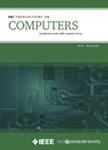版权所有:内蒙古大学图书馆 技术提供:维普资讯• 智图
内蒙古自治区呼和浩特市赛罕区大学西街235号 邮编: 010021

作者机构:Wayne State Univ Dept Elect & Comp Engn 5050 Anthony Wayne Dr Detroit MI 48202 USA Ohio State Univ Dept Comp Sci & Engn Columbus OH 43210 USA Los Alamos Natl Lab Los Alamos NM 87545 USA
出 版 物:《IEEE TRANSACTIONS ON COMPUTERS》 (IEEE Trans Comput)
年 卷 期:2010年第59卷第11期
页 面:1508-1519页
核心收录:
学科分类:0808[工学-电气工程] 08[工学] 0812[工学-计算机科学与技术(可授工学、理学学位)]
基 金:US National Science Foundation [CCF-0602152, CCF-0702500] Department of Energy US Department of Energy [DE-AC52-06NA25396]
主 题:Replacement algorithm locality cooperative caching networked file system
摘 要:In a distributed environment, the utilization of file buffer caches in different clients may greatly vary. Cooperative caching has been proposed to increase cache utilization by coordinating the shared usage of distributed caches. It allows clients that would more greatly benefit from larger caches to forward data objects to peer clients with relatively underutilized caches. To support such coordination, global cache utilization must be dynamically evaluated. This, in turn, requires an effective analysis of application data access patterns. Existing coordination protocols are demonstrably suboptimal in this respect, exhibiting inefficient memory utilization and undue interference among clients. We propose a locality-aware cooperative caching protocol, called LAC, that is based on analysis and manipulation of data block reuse distance to effectively predict cache utilization and the probability of data reuse at each client. Using a dynamically adaptive synchronization technique, we keep local information up to date and consistently comparable across clients. The system is highly scalable in the sense that global coordination is achieved without centralized control. We have conducted thorough trace-driven simulation experiments to assess the performance differences between LAC and various existing protocols representative of the general class. Using a realistic and representative cost model, we show that the LAC protocol significantly and consistently outperforms existing cooperative caching protocols, demonstrating high and balanced utilization of caches across all clients. In our experiments, LAC reduces block access time by up to 36 percent, with an average of 31 percent, over the system without peer cache coordination, and reduces block access time by up to 22 percent, with an average of 13 percent, over the best performer of the existing protocols.